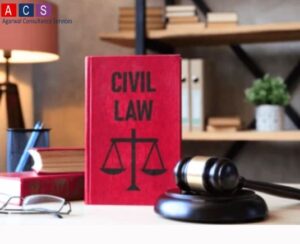Civil lawyer in assam
Civil lawyers in Assam represent clients in courts, tribunals, and alternative dispute resolution forums. A civil lawyer understands all the noncriminal aspects of a legal dispute between two parties. Civil disputes commonly focus on individuals, personal relationships and property disputes. A civil lawyer tries to resolve conflicts and disputes between two affected parties. Civil Lawyer seek redress for damages in the form of monetary compensation for their clients. Civil Lawyer work starts with the filing of a suit and continues until a judgment is passed.
Get Started
Among India's Top 100 Consulting Firm
WHAT IS CIVIL LAW ?

Civil law deals with behavior that constitutes an injury to an individual or other private party, such as a corporation. Examples are defamation (including libel and slander), breach of contract, negligence resulting in injury or death, and property damage. The parties involved in a civil suit are Plaintiff and Defendant.
In civil cases, cases are initiated (suits are filed) by a private party (the plaintiff); cases are usually decided by a judge (though significant cases may involve juries); punishment almost always consists of a monetary award and never consists of imprisonment; to prevail, the plaintiff must establish the defendant’s liability only according to the “preponderance of evidence”; and defendants are not entitled to the same legal protections as are the criminally accused.
Civil Matter is basically about conflict resolution between private individuals. It ensures that disputes between individuals do not escalate and turn into violent confrontation. It encourages cooperation between individuals, members of society, controlling unruly behaviour of the individuals and also controls unethical business practices prevalent in the society.
WHY CIVIL LAWYER REQUIRED?
Civil law is basically about conflict resolution between private individuals. It ensures that disputes between individuals do not escalate and turn into violent confrontation. It encourages cooperation between individuals, members of society, controlling unruly behaviour of the individuals and also controls unethical business practices prevalent in the society
CIVIL LAW CLASSIFICATION
A civil law is divided into substantive and procedural law. The Substantive Law is a statutory law that defines and determines the rights and obligations of the citizen to be protected by law. Procedural Law or Adjective Law deals with the enforcement of Law that is guided and regulated by the practice, procedure, and machinery.
The Code of Civil Procedure, 1908 is a procedural law related to the administration of civil proceedings in India. The Code is divided into two parts: the first part contains 158 sections and the second part contains the First Schedule, which has 51 Orders and Rules.
Civil suits are generally money suit, title suit, mortgage suit, redemption suit, foreclosure suit, matrimonial suit, execution suit, miscellaneous suit, eviction suit, interpleader suit, etc.
1. Contract Disputes
A contract debate includes one individual or a few individuals who marked the same contract but for one reason or another will not or cannot fulfil the legitimate commitment. Now and then, contract debate emerges since the terms were poorly composed.
Still, the most reason is overextension, meaning that one or more people don’t have sufficient physical bolster or cash to require care of the legally binding commitment. This sort of civil claim includes a debate over a contract. Contract disputes can include numerous businesses or people.
Any association or client relationship depends on a contract to guarantee both parties do what has been guaranteed. When one party breaks the understanding, for any reason, a claim is frequently the result. Types of contract disputes:
- Controversies between a landlord and a tenant
- Disputes about remodelling between a homeowner and a design contractor
- The dispute over land sales
- Defective product for sale
- Non-delivery of purchases charged
- Violation of the deal on non-compete
- Infringement of a business arrangement
2. Torts:
With torts, one individual affirms that another individual caused enthusiastic or physical hurt. There are really a few distinctive shapes of torts. For illustration, a tort can relate to the security of a person’s property, a person’s physical security, and indeed monetary security.
When related to harm or mischance, common torts ordinarily include cases of attack and battery. For carelessness tort cases, one individual affirms that a caregiver fizzled to perform his or her sketched out obligations. Tort claims could be recorded against commerce or a person and include allegations of charged carelessness.
In this case, the offended party inquires for corrective harms to compensate for restorative bills, misplaced time at work or cash went through supplanting harmed property.
There are three categories of tort claims:
- Negligence – Inadvertent harm or damage.
- Intentional – A thought of wrongdoing.
- Strict risk – Based on a strict obligation to guarantee something is secure. It does not require carelessness or expectation.
Examples of tort claims:
- Assault & battery
- False imprisonment
- Fraud
- Emotional distress
- Invasion of privacy
- Car or bicycle accidents
- Medical malpractice
- Slip & Fall
- Defective product that causes an injury
Animal attacks (dog bites)
3. Class Action
Likenesses exist between tort cases and lesson activity claims. With a lesson activity, as it were, the arrangement gives lawful representation for a course or gathering of individuals who were hurt in a few ways by the same thing. This may be an introduction to dangerous materials, flawed items, physical ailment, and so on.
The objective is to demonstrate that numerous individuals were adversely affected earlier to an item review or fitting cure. Class activity suits are comparative to tort cases, but the “plaintiff” is really a bunch or lesson of individuals. The “defendant” is regularly an enterprise that’s denounced carelessness or deliberateness acts that caused numerous injuries. Types of lesson activity claims can incorporate:
- A business which exposes individuals to dangerous substances
- Defective goods that have caused multiple injuries, disease or death
- Defective parts of the vehicle that have contributed to accidents
- A corporation or organization that has deliberately caused damage to a group of people
- A person or business that has set out to defraud a group of people
4. Complaints Against authority
Although it is common for complaints against a city or government to reach an out-of-court settlement, there are a few occasions in which the government denies paying. This can be once you have to have a qualified lawyer on your side.
For any case in which the offending party charges hurt due to city approach or law, a respectful case can be brought. Often a person or bunch of individuals will record a claim against the city of government. These cases ordinarily include a few activities that caused hurt to citizens.
It might moreover include claims that someone’s gracious rights have been violated. Civil cases can be complicated legitimate procedures. Any lawful firm that gives private or commercial law administrations ought to be mindful of the diverse sorts of gracious cases that can arise.
5. Property Dispute
A property dispute includes neighbors who both feel they are the legitimate proprietor of arriving or genuine bequest. In any case, a property debate can moreover be recorded on the off chance that a neighbor harmed a person’s genuine domain or property.
The foremost common type of debate must do with the property line. As a rule, a gracious case is recorded when one neighbor harms, builds a foundation or employs a parcel of land that the other neighbor accepts is legitimately his or her. With impartial claims, the offended party inquires the court to arrange a company or person to abstain from doing something, which is known as a directive. Property law includes debate around property proprietorship and harms to one person’s property or genuine domain.
There are numerous diverse sorts of property debate that a respectful case lawyer may handle. One common one is the property line debate, in which one party affirms that a neighbor crossed the property line boundary between their two homes for building or planting. This sort of case isn’t almost a money related remunerative for past damage but is done to anticipate a future destructive act. Equitable claims might inquire the court to:
- Stop a developer from building a commercial plaza in a residential area.
- Have a party cease a certain activity
- Transfer property to the rightful owner
- Order a repair to property that is dangerous to visitors
Order a change of policy or to post warning signs
CIVIL LAW FILING FEE
In filing civil cases, court fees are applicable on every suit. There is fixed court fee according to the valuation of the suit. The court fee applicable will depend on the nature of relief claimed and the type of civil cases filed. Court fee cannot be applied haphazardly, otherwise the suit will be kept pending for DCF (Deficit Court Fee).
CIVIL LAW PROCESS
Generally following process are followed under Civil Procedure Code, 1905 (as amended).
- Filing of the plaint.
- Issue process to the defendant
- Filing of written statement by defendant
- Documents
- Issue
- List of witnesses
- Evidence from plaintiff side
- Evidence from defendant side.
- Arguments
- Judgement & Decree
- Execution
DOCUMENTS REQUIRED FOR CIVIL FILING
- Plaint
- Relied upon documents in connection with the plaint.
FAQ
Civil suit to be filed in the civil court.
the case seeking remedy with reference to the property and other civil rights given under any civil law.
Court fee, process fee and copying fee.
Court fee- at the time of filing suit. Process fee- to be paid for issuance of summons, warrant etc. Copying fee- to be paid for getting certified copy of the documents order or judgement.
such a person is eligible to get free legal aid under legal services authority. However, prior to it he has to file application seeking permission to do so.
No, time depends from case to case.
Yes, history of a case can be viewed in KIOSK available in most of the courts and also on the website E-courts.
legal representative of the deceased are to be brought on record.
A party in favour of whom order/judgement is passed will file the execution petition seeking execution of the relief granted.
Alternate Dispute Resolution like- Arbitration, conciliation, judicial settlement, mediation.

